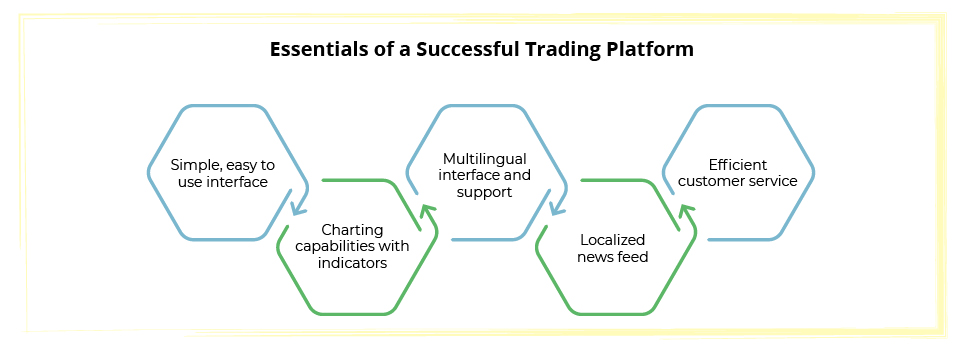User satisfaction is an integral part of building a successful trading platform and in this final article of the series, we further our understanding of what goes into a user-friendly online trading platform by approaching it from the user’s point of view.
With the first article providing an introduction to the emergence of multilingual trading platforms and the second one detailing of what constitutes a successful trading platform in practice today, let’s now read about what extensive users have to say about these aspects and the difference that localisation makes when it comes to improving the usability.
Today, we speak with Bomy Gandhi & Vishal Shah regarding their views on various trading platforms that they have come across.

Bomy is a finance professional, currently a full-time banker in London with a leading European Bank. He has previously worked with NYSE Liffe and has been an active trader over the past 15 years across emerging as well as developed markets.

Vishal, also a finance professional and an active trader & investor, currently works for a German multinational company based in Vadodara, India. Vishal has worked with multiple wealth management and brokerage firms like Enam AMC (taken over by Axis Bank), DBS (The Development Bank of Singapore) and Sharekhan (now a subsidiary of BNP Paribas).
Q. Hello and thank you for being a part of this discussion. It would be interesting to know about your trading journey and the kind of products you trade in.
Bomy: I have been investing for a decade and a half, beginning with trading in the Indian financial markets in stocks and derivative products like futures and options. I have been based out of UK for over a decade now and have been trading in forex, stocks and stock derivatives as well as commodities in the UK markets along with other developed markets in the US and Europe.
Vishal: My journey into investing and trading started after I took up my first job with an asset management company in India close to 20 years ago and ever since I’ve been trading not only for my corporate clients but as an individual investor and trader as well. I regularly take short term positions on stocks and derivatives, exclusively in the Indian markets. Online trading has enabled many like me to be able to actively participate in the markets regularly along-with having a full-time job.
Q: That is so true, especially in the last decade with mobile penetration across the globe and better wireless internet connectivity; we have seen a wider geographical spread of traders across the globe and not just concentrated around financial capitals.
Tell us about the different trading platforms that you’ve used over the years.
Vishal: Over a period of time, I have come across a multitude of trading platforms as a part of my professional engagement with various brokerages and asset management companies and in a personal capacity as a trader. I’ve used Sharekhan’s services most extensively. Among others, I’ve had exposure to Motilal Oswal, HDFC securities and Zerodha to name a few.
Bomy: For trading in the Indian markets, I’ve used web-based trading platform from ICICIDirect – one of the pioneers of online trading in India, also used platforms from Sharekhan & Motilal Oswal securities. Coming to global trading platforms, I have been using IG’s web-based platform as well as Meta Trader 4 extensively for the past few years. SaxoTrader, IWeb, Dukascopy are some of the others that I’ve used over a period of time.
Q: That’s quite a few between the two of you! This will definitely help us dive deeper into knowing what goes into making a successful platform or trading app but before that brief us about some of the changes that have come about in the online trading environment over the last decade?
Bomy: To begin with, trading platforms were quite basic in nature. In effect, they were designed to provide an interface to execute your orders. But with the passage of time and evolving technology, they now integrate a lot of additional features like live charts and statistical indicators, news feeds, stock-specific and industry-specific events, global and country-specific data points and events.
To give an example, a lot of brokers now provide a stock-specific sentiment indicator which is based on their own customer base and their positions. Systems have definitely become faster, with improved internet speed it is now possible to have real-time charts which wasn’t the case 15 years ago.
A lot of platforms are now multilingual or offer localised data and news flow for their target markets.
Vishal: I agree, multilingual trading platforms make it much easier for users to place their trust in the product. In turn, this increases global market penetration as well.
Execution of trades has also become far more reliable now. Trading from anywhere – anytime is now possible at the click of a button. Financial data is easily available and a multitude of ratios are given on a platter to help traders and investors make decisions. As the world grows closer with communications and open markets, platforms have evolved to offer products from markets around the world as well as include newer ones like cryptocurrencies.
Q: That does make the decision to choose a particular provider quite difficult for the users. What are the top contributing factors that make you choose one platform over the other?
Vishal: Order execution is top priority, which is what a trading platform or app is built for.
A clutter-free user interface, a robust news feed that includes corporate announcements and regulatory information along-with crisp financial data representation are some of the other aspects.
Bomy: To me, an interface that’s easy to understand and use is one of the top factors. Charting facilities bundled with a host of statistical indicators are always a delight for traders to work with.
Vishal already talked about accurate and quick news flow, I would go a step ahead on that in terms of localised news feed with global reporting as well since each market is unique but also closely linked to global markets and economy.
Efficient customer support is another aspect that ranks high on my list. Customer service right from the onboarding of a new client to effective query and complaint resolution is the key and the best way to do it is to provide multilingual support in a global environment so that communication is accurate.

Q: With these factors in mind, could you tell us what challenges are faced by most traders in efficiently using such a platform or an app?
Vishal: Most traders do not fully comprehend the features built into the platforms they use. Being able to fully utilise the capabilities on offer is one of the first and most common challenges faced. Often, a lot of time goes into understanding it.
Another aspect that comes to mind is finding an efficient way of utilising the data or news flow that comes in. Often, it is difficult to channelise the news according to your needs and geography, especially when the event or news is global in nature. Therefore to find the right degree of localisation is a big challenge.
Bomy: I think the reason we put simplicity of user interface as one of the top reasons for choosing a provider stems from the fact that traders and investors alike want to be confident when using such platforms whether web-based, software or mobile apps.
It is imperative that the platform comes with excellent tutorials and demos regarding its usage. I strongly agree with Vishal in terms of localising event calendars as well as financial data since that is one of the most challenging aspects to get it right across markets and users from different geographies.
Similarly, providing customer service that is quick and efficient is a challenge a lot of providers face when it comes to keeping customers that are used to native languages happy. Accurate financial translation is therefore required and finding native translators is a challenge.
Q. That certainly sounds like translation and localisation play a big role in customer satisfaction and the growth of a platform globally. Please elaborate on the benefits that accrue from developing a multilingual trading platform that is able to adapt to the right amount of localisation?
Vishal: As we discussed earlier it is always easier and most efficient if there are tutorials and demos in regional languages. In the Indian markets, one can find numerous examples of regional languages being used for such demos as well as other marketing material.
There are regular conferences and talks arranged by brokerages and asset managers in regional languages for effective out-reach to customers. Events like the financial budget and other economic events are usually followed by con-calls and webinars for investors. These are usually multilingual in nature and updates like regulatory information and product upgrade brochures are regularly found in multiple languages. This clearly indicates that the idea of multilingual support has been well established within the trading industry.
Bomy: What Vishal has highlighted about multilingual aspects within a sub-continent like India is applicable across the globe. Most of the platforms that I’ve had exposure to come with multilingual support. These are also adequately localised to cater to the needs of traders in specific geographies as well as for these platforms to adhere to the regulatory norms that differ from country to country.
Financial data also requires very precise translation as users in different countries are used to seeing and evaluating them in particular formats. Financial terminologies may also differ, even across markets that speak the same language! Hence, a trading platform can only achieve wide-spread acceptance if these factors are taken care of appropriately.
Urjit: Thank you, gentlemen, for your time and for sharing your industry insights on the subject. Your experience as first-hand users is invaluable and has given clarity on which aspects need to be localised for clients and how important language translation and multilingual support is for trading platforms these days.
Parting Thoughts:
As we conclude our series of articles on multilingual trading platforms, it’s important to remember why online trading platforms emerged in the first place – for ease of access. Although such platforms are virtually available to anyone who uses the internet, localisation is key in determining the extent to which a platform can enable trades and drive customer satisfaction.


